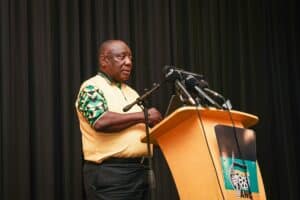Diplomats and foreign investors widely see the president as the last hope of salvaging Africa’s most industrialised country.

When Cyril Ramaphosa replaced Jacob Zuma as president last February, there were huge sighs of relief well beyond the borders of South Africa. Now that euphoria has turned to anxiety.
Ramaphosa, a labour leader turned billionaire businessman, brought an impressive reputation and unique skill-set to the job. But as time has passed, the enormity of his task in cleaning up the wreckage caused by Zuma’s scandal-plagued nine years in power has become more evident.
Diplomats and foreign investors widely see Ramaphosa as the last hope of salvaging Africa’s most industrialised country and perhaps restoring the huge moral leadership it enjoyed under Nelson Mandela, after a sorry decline that instead encouraged Western stereotypes of a corrupt African state.
Ramaphosa’s foreign admirers remain strong backers but are starting to worry about what would happen if he does not succeed.
The 65-year-old president suffered a significant setback this month when his close ally Nhlanhla Nene resigned as finance minister after admitting he had falsely denied having private meetings with the Gupta family.
Their links with Zuma and alleged plundering of billions of rand of state funds in what is known as state capture are at the centre of allegations against the former president.
Blow to Ramaphosa
Although Nene was previously fired by Zuma in 2015 for blocking a suspicious $100 million nuclear power deal with Russia, his forced resignation damaged Ramaphosa’s credibility in fighting corruption.
The president handled the crisis skilfully, mitigating the damage by swiftly accepting Nene’s resignation and appointing respected former central bank governor Tito Mboweni to replace him – a decision cheered by the markets.
But pressure for Nene’s removal came not just from the opposition but from Zuma’s allies, who still occupy senior positions within the ANC and limit Ramaphosa’s room for manoeuvre.
Zuma may be on the back foot and facing serious corruption charges, but he obviously still controls a potent patronage network.
Internal party fights are far from being the only problems facing Ramaphosa, with reviving the economy his biggest focus after the depredations of the Zuma era.
South Africa expectedly fell into recession in the second quarter of this year, and unemployment stands at 27% – 55% among young people.
This fuels both unrest against the ANC, weakening its post-apartheid stranglehold on power, and spectacular levels of violent crime.
Crime and unrest
Riots against the failure to deliver basic amenities like housing and water to the black population are already at record levels this year, while even the police minister says his country’s violence “borders on a war zone”.
South Africa has the fifth highest murder rate in the world, and in some townships, it is more than four times higher than in Afghanistan, the United Nations says.
A symbol of the loss of the ANC’s moral compass is the deadly rivalry between some party officials over huge sums skimmed off public works contracts.
A government enquiry in KwaZulu-Natal, Zuma’s home province, said more than 80 people have been killed in politically-related hits in the last seven years.
Clearly, the dreams of transforming South Africa after the end of apartheid have turned to nightmares in some areas. Ramaphosa’s challenge is to turn the tide before the ANC loses its dominance in elections expected around next May.
Central to this challenge is land reform, where he was pressured by the rising radical left Economic Freedom Fighters (EFF) into supporting moves to pass a constitutional amendment backing expropriation of land without compensation.
Elections will be key for Ramaphosa
Although his action spooked markets, the redistribution of land is clearly at the centre of any effort to make South Africa more equitable and boost support among the poor.
At least 3.5 million people were forced from their land during apartheid after previous centuries had already seen large-scale dispossession by white people.
The ANC has succeeded in transferring only 9% of commercial farmland to black South Africans – who comprise 80% of the population – since the end of apartheid, against a target of 30% by 2014.
Ramaphosa has repeatedly pledged that land will be transferred only within the law and in an orderly fashion that would avoid the disastrous land grab and economic catastrophe suffered by neighbouring Zimbabwe.
He struggled to contain his irritation in August with US President Donald Trump, who tweeted a false claim that white farmers were being systematically killed to seize their land.
Although experts immediately shot down Trump’s claim, it is still peddled by some white South African citizens and their media allies in Britain and America. This could have an impact on the conservative investors Ramaphosa is trying to woo.
The South African president’s strategy in the face of multiple distractions is to try to boost the economy and employment as quickly as possible through market-friendly reforms and a drive to attract $100 billion in investment over the next five years, with $35 billion already pledged by Saudi Arabia, the United Arab Emirates, and China.
A growing economy may help Ramaphosa to mollify objections to privatisation from his allies in the trade union movement and communist party, but next year’s elections will be key to his survival.
If he can make clear gains, he should have the momentum to defeat his adversaries within and without the ANC and make the Rainbow Nation a more prosperous, peaceful and fair society, capable of re-establishing its influence in both Africa and the world.
Barry Moody is a correspondent with ANA partner News-Decoder.
For more news your way, download The Citizen’s app for iOS and Android.






